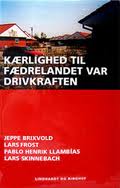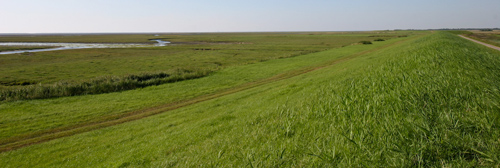Through the heath with four Danes
 In August 2006, during a conference in Åbo, Finland, British researcher Claire Thomson gave a talk about quite an odd little book that centers on landscape, nation, and memory.
In August 2006, during a conference in Åbo, Finland, British researcher Claire Thomson gave a talk about quite an odd little book that centers on landscape, nation, and memory.
Entitled Kærlighed til fædrelandet var drivkraften (Love for the Fatherland was Driving Force), the book consists of personal narratives from Jeppe Brixvold, Lars Frost, Pablo Henrik Llambías and Lars Skinnerbach as they go in search of Denmark in the flat, empty landscape of the peninsula that spawned countless classics of literary romanticism.
Eighteen months later, I finally got a hold of the book myself and have added it to my reading list. There's something oddly compelling about this strange tale of four contemporary authors hiking haplesslessly through the Jutlandic heath, in search of the spirit of Steen St. Blicher — and of Denmark. As Brixvold notes,
De færreste danskere kan i dag bruge ord som «socialism,» «kristelighed» eller «fædrelandssind» uden at rødme, og alligevel er de de mest tydelige grundbestanddele i det danske velfærdssamfund. (76)
(Few Danes can use words today like "socialism," "christianity" or "patriotism" without blushing, but they are still the clearest fundamental elements in the Danish welfare society.)
Through this national landscape wander the ghosts of outsiders: kartoffeltysker, gypsies and Travellers who once populated Blicher’s stories, but who have disappeared or been assimilated.
Natmændene ... blev landarbejdere og sled sikkert selv med hedens opdyrkning, de kom på fabriker og forsvandt i byernes proletariat. De tog mørket med sig, og i dag er landet oplyst... Mørket er væk. Og det er det så lligevel kun i én forstand. Ikke alene stikker erindringen om heden og dens røvere og mordbrændere hovedet frem i f.eks. indvandrerdebatten, mørket har også fundet helt nye veje. I dag er vi ikke kun bange for indvandrere, vi er bange for hvad som helst... Vi kultiverer så en privat fiksering på et eller andet og frygter dét. Vi personliggør mørket, skaber det selv. (77-78)
(The Travellers... became farm workers and surely wore themselves out with the cultivation of the heath, they went to factories and disappeared in the urban proletariat. They took the darkness with them, and today the country has been lightened... The darkness is gone. And yet only in a certain way. The memory of the heath and its robbers and arsonists sticks its head forward not only into the immigration debate, the darkness has also found completely new paths. Today we are afraid of not only immigrants, we are afraid of everything... We cultivate in this way a private fixation with something and fear that thing. We personalize the darkness, we make it ourselves.)
Brixvold’s discussion of "darkness" explicitly links the fear of the unknown or foreign in Blicher’s romantic/realist stories with today’s debates about immigration and assimilation. Was the return of Brixvold, Llambías, Frost and Skinnebach to Blicher’s storied heath an attempt to exorcise these ghosts? Or was it an attempt to salvage a kind of communal solidarity neccesary for the continued existance of the welfare state? Can any of these four authors escape the shadow of Blicher and Grundtvig when writing about their country, or is the weight of 19th-century thought about the nation overwhelming even in this, the 21st century?

 In August 2006, during a conference in Åbo, Finland, British researcher Claire Thomson gave a talk about quite an odd little book that centers on landscape, nation, and memory.
In August 2006, during a conference in Åbo, Finland, British researcher Claire Thomson gave a talk about quite an odd little book that centers on landscape, nation, and memory.